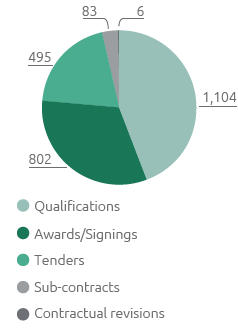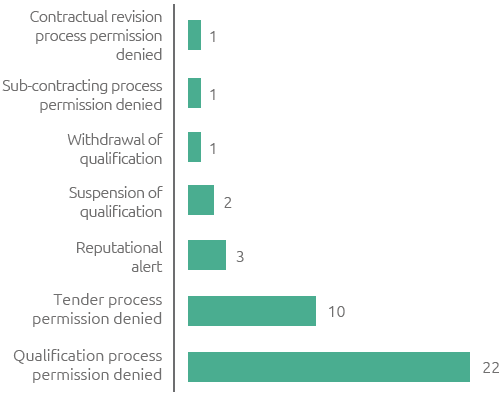The fight against corruption and illegality

Ethical principles and business values
In its day by day operations, Snam works with:
- transparency, honesty, fairness, good faith in full compliance with competition protection rules;
- involvement of stakeholders, including dialogue on sustainability and corporate social responsibility;
- creating competitive value for the company, its stakeholders and the territories in which it operates;
- protecting and promoting human rights;
- protecting all forms of individual freedom and repudiating any type of discrimination, violence, corruption (in any form thereof with reference to any public or private persons), and forced or child labour;
- recognising and safeguarding the dignity, freedom and equality of human beings;
- protecting jobs and trade-union freedom, health, safety, the environment and biodiversity.
The main internal regulatory reference for the fight against corruption is the Anti-corruption guideline that applies to Snam and its subsidiaries and is also brought to the attention of the other investee companies in order to promote principles and behaviours consistent with those expressed by the parent company. The guideline takes its inspiration from the principles of ethics, transparency, integrity and expertise already referred to in the Code of Ethics and also strives for the continuous improvement of the awareness of Snam’s people to recognise corruption and any other type of fraud, as well as their responsiveness to play an active role in the prevention, suppression or reporting of possible violations of anti-corruption laws. The Anti-corruption guideline is consistent with the tenth principle of the Global Compact, which rejects corruption “in all forms, including extortion and bribes” and clearly outlines permitted and prohibited conduct. In particular:
- it is prohibited to offer, promise, give, pay, authorise anyone to give or pay, directly or indirectly, an economic or material benefit to a public or private official (active corruption);
- it is prohibited to accept a request from, or solicitation from, or authorise anyone to accept or solicit, directly or indirectly, an economic or material benefit from anyone (passive corruption);
- it pays particular attention to the selection and qualification of suppliers, the awarding of contracts, the management of contracts, the standard terms of protection, including those of commitment to respect Anti-Corruption Laws and to verify the ethical requirements of suppliers;
- it establishes that all of Snam’s relations with, which refer to, or which involve third-parties shall be conducted in full compliance to the provisions of the Anti-corruption guideline and the instrument therein.
The Anti-corruption guideline is part and parcel of a broader business ethics control system adopted by Snam that aims to ensure the company’s compliance with national and international laws and best standards. In this regard, Snam provides specific training to make personnel aware and it carries out monitoring in order to check the level of dissemination and knowledge.
To prevent the risk of corruption and fraud in general in the supply chain, all suppliers and subcontractors are required to sign the Ethics and Integrity Agreement that allows to carry out reputational analysis aimed at identifying – based on public information – the possible risks of infiltration by organised crime.
In 2019, Snam worked with different bodies and organisations, including:
- the OECD taking part:
- in the OECD Gobal Anti-Corruption and Integrity Forum, an event that took place in March on “Tech for Trust: risks and opportunities of new technologies for anti-corruption & integrity”, during which Snam was invited to a select session on State Owned Enterprise, organised by some of the representatives of the OECD Directorate of the Corporate Governance & Corporate Finance Division, and aimed at gathering together some of the Compliance & Anti-corruption Offices of some of the biggest experts in the field;
- the Trust in Business Forum in October, where Snam was invited to two days totally dedicated to taking an in-depth look at the role of trust in business, with a panel dedicated to issues such as: “Strategies to strengthen trust: performance measurement, audit quality, trust beyond compliance”, “Levelling the playing field: role of regulators, policy makers and the Board in building trust in business” and “Developing solutions”;
- to the Working Party on State Ownership and Privatisation Practices, dedicated to the analysis of the methods for the correct implementation of the guidelines published in May;
- to the annual consultation of the OECD Working Group on Bribery in December 2019, during which several observations were made and implemented on what was circulated several weeks earlier by BIAC (Business at OECD) and the subject of consultation. In addition, in October, BIAC appointed Snam’s General Counsel as the Vice-Chair of the Anti-corruption Committee, an extremely important recognition for Snam as it is the only Italian company in the leadership of the permanent members of the business at the OECD.
- Transparency International Italy, taking part:
- in the Business Integrity Forum, which took place in June, at the Scuola Superiore Sant’Anna di Pisa, during which Snam participated to two round table discussions on: “Training and cultural input to create a corporate climate aimed at strengthening the values and culture of lawfulness” and “Transparency of beneficial ownership” and, also, Snam’s General Counsel, following the speech by the Minister of Justice, gave a speech on “Ethics and integrity in the private sector”;
- in the session “Synergies between public and private: vices and virtues”, as part of the 4th edition of the Business Integrity Forum National Event of Transparency International Italy and the annual presentation of the Business Index on Transparency.
- the Ministry of Foreign Affairs and International Cooperation took part:
- in the presentation of the 2nd Report on Italy of the United Nations Convention against Corruption that took place in May;
- in the 9th Italy-Latin America Conference in October, where Snam’s General Counsel took part in a panel on “Public tenders in Italy: Transparency and Integrity”;
- in the 8th Conference of the Member States of the United Nations Convention against Corruption in Abu Dhabi in December, during which Snam participated in the Italian Business Integrity Day reporting on the best practices implemented to manage the complexity related to the issues of compliance and anti-corruption. In addition, in this context Snam was also invited to take part in a round table discussion organised by the United Nations Office on Drugs and Crime called “Private sector as a Partner in Anti-Corruption Education”, an opportunity for Snam to internationally demonstrate its experience and commitment to training as well, which it conducts not only for its own personnel, but also externally.
- In the World Economic Forum, as part of the Partnering Against Corruption Initiative (PACI) of the World Economic Forum in October, and taking part, in the same month, at the half-yearly meeting, where it could make comparisons on specific issues of interest at a round table discussion where leading Compliance & Anti-corruption Officers from some of the most important companies in the world took part.
- Business 20 (or B20), under the Japanese Chairmanship of the B20 for 2018/2019, as the only Italian company mentioned in the document presented in May 2019 at the Tokyo Summit in relation to the SDG16 (Peace, justice and strong institutions) as a “Tangible Example” of a company that demonstrates a firm commitment to the fight against corruption. In addition, as confirmation of this recognition, in November it was included among the permanent members of the “Integrity & Compliance Taskforce” under the Saudi Chairmanship of B20, whose work will begin in January 2020 with an inception event and continue for the entire year, until the summit in October, where the results of the work will be presented with the proposals to take to the G20.
The Company illustrated its tools to safeguard transparency and in the fight against corruption which also includes training meetings for new hires on business ethics, lawfulness and anti-corruption during which, in 2019, around 321 hours of training was delivered.
Snam also removed all manual compliance procedures and improved the traceability, transparency and security of all its operations, digitalising the data information flow to the National Anti-corruption Authority through a direct interface between the respective information systems and the allocation of a tender identification code (CIG).
Reputational checks
In 2019, 5,348 reputational checks were carried out on counterparties, of which 2,490 involved suppliers, subcontractors and participants in tenders, that break down as illustrated in the graph below.
Following the checks conducted and the investigation by the Technical Secretariat, the Evaluation Team, after finding unlawful behaviour, arranged 40 provisions.
Reputational checks on suppliers, subcontractors and participants in tenders:
Breakdown by type (no.)

Measures (no.)
